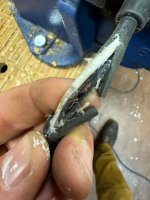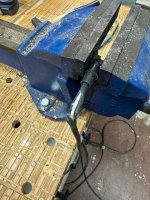bwehman
Member
- Joined
- Mar 21, 2016
- Messages
- 433
My trusty always-connected-to-the-CT cord finally started acting weird. I used a multimeter to test for continuity and found one of the wires should be broken. Popped it open and found the suspect. Can it be fixed? Do they sell repair ends? It'd be a shame to toss an otherwise perfectly good cord.


